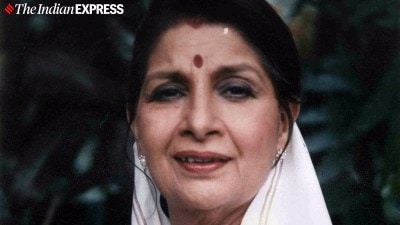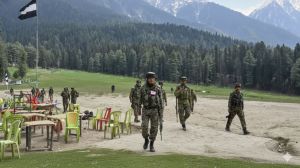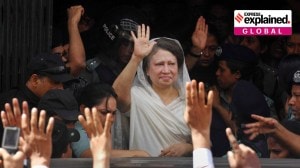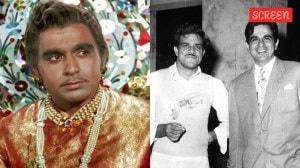Two mavericks on a burning deck
Almost exactly a year ago, while writing a rather spirited defence of George Fernandes the maverick, in this very column, I had somewhat ...

Almost exactly a year ago, while writing a rather spirited defence of George Fernandes the maverick, in this very column, I had somewhat facetiously stated that his only qualification for the defence minister8217;s job could be that he is a life-long loose cannon, albeit of a high calibre. That light-hearted remark has now acquired a prophetic ring that is scary. Scarier still that he is now locked in this death-or-death confrontation with yet another loose cannon, Admiral Vishnu Bhagwat. Yet again one of no mean calibre.
The problem is, this mutually destructive battle is being fought on the burning deck of not merely the Indian Navy but the entire defence establishment. Each day there are new allegations, leaks and counter-leaks, and each side has already divided up the media among friendlies and hostiles, the dirty linen of defence and even the intelligence establishment is being washed in public.
The credibility of the higher defence organisation is zilch. If an average Indian believes Fernandes8217; side of the story, it would seem that at least two wings of the armed forces, the Navy and the Air Force, had somehow come to be led by self-seeking, cynical, incompetent chiefs. If he believes Bhagwat, instead, it would seem as if a nuclear-armed defence establishment is being controlled by an irresponsible maverick running his personal agenda and that the Army is led by a self-seeking careerist. Each side has accused the other of charges amounting to high treason. And if the poor, confused Indian believes neither of the two, it would seem to him that all hell has broken loose in the most sensitive and crucial areas of governance without the Prime Minister being able to do anything about it.
This, unfortunately, is not a new situation for us. What is dangerous, however, is the way the entire establishment, the entire political class and the so-called system of checks and balances so essential in a democracy, quickly tends to take for or against positions in situations like this without subjecting the claims and charges to any scrutiny.
It is difficult to find one political leader or even the leading voices in other institutions in our system looking at these issues through a prism other than that of political self-interest. This self-destructive trend has been growing for some time. But it was the way the Jain Commission conducted its inquiry and the motivated leaks of its report were subsequently exploited that gave us the first evidence of the kind of damage this could cause to national interest.
The Commission demanded, and under political pressure was granted, access to details of covert Indian operations in Sri Lanka and intelligence intercepts. These made no one any wiser as to the factors leading to Rajiv Gandhi8217;s assassination. But, woven into a complex, incomprehensible story of intrigue and subterfuge, these brought India a great deal of disrepute.
Then, completely arbitrary and illiterate insinuations in the report were used by the Congress to bring down I.K. Gujral8217;s government. No one has heard of Jain and his report since then, nor of his airy-fairy charges of DMK complicity in Rajiv8217;s assassins. In fact we may have, in the next two weeks, a Congress-led government sworn in with DMK support 8212; that is, if you believe Harkishen Singh Surjeet. It is quite possible now that the Bhagwat controversy too will meet exactly the same fate as Justice Jain8217;s masterpiece once it has been milked politically.
That is why, it is time the Prime Minister moved decisively to stop this political football. The controversy has already dealt a crippling blow to the credibility of India8217;s higher defence establishment. The jury may still be out on who is to blame 8212; or who is to blame more 8212; Bhagwat or Fernandes. But the fact is that this is the greatest blow to our armed forces since the humiliation of Se La and Bomdi La in 1962. It would be criminal to allow this to be exploited for political gain. It would also be suicidal to sweep it under the carpet.
The argument against a detailed, parliamentary investigation is that it would expose far too much of the seamier side of our covert activity. This is touching, considering the fact that documents relating to every single aspect of the co-ntroversy are now floating freely all over the Capital, from media offices to the diplomatic circuit. There isn8217;t one thing about the supposedly super-secret Operation Leach that the cocktail circuit doesn8217;t know. Copies of letters allegedly written by Morarji Desai to Fer-nandes, cautioning him on his 8220;activism8221; on certain aspects of Ind-ia8217;s nuclear 8220;relations8221; with Libya are freely circulating.
Similarly, the photocopiers in the Ministry of Defence have worked overtime over the past few mo-nths making copies of adverse entries on Bhagwat8217;s old Annual Confidential Reports. Transcripts of Harinder Singh8217;s taped phone conversations with at least three fellow admirals, where he seeks to defend himself prior to Bhagwat8217;s sack, are landing up in newspaper offices in open envelopes. So what is left to hide? This is now a case of is hamaam mein sabhi nange everyone is naked in this bath-house. So why shy away from a proper democratic inquiry?
Rangarajan Kumaramangalam, the parliamentary affairs minister in this government, made a stunningly candid admission in a recent interview to this paper. The government, he said, was not in favour of a JPC as, 8220;let8217;s be very frank, no JPC is secret8221;. When great democracies like the US, whose intelligence agencies employ a million more dirty tricks than ours, subject these operations to Congressional scrutiny, this argument sounds preposterous. But, given the modest levels of integrity and intellect in our Parliament you cannot dismiss it out of hand. But would we, then, sweep all this under the carpet just because we collectively believe that our MPs are not worthy of our trust, even in an in-camera JPC?
Vajpayee must rise above the politics of the day and look for other solutions. What if he called Sonia Gandhi and said, 8220;Soniaji, even if you come to power tomorrow, would you really like to inherit this mess? So stop politicising this issue. I will set up a committee consisting of three former, respected chiefs of the three services, a respected former bureaucrat may be a former defence secretary like N.N. Vohra and headed by a judge of impeccable integrity, like J.S. Verma. The committee will hold its proceedings in-camera and will be provided every bit of detail and documentation it needs. The report, to be submitted in 90 days, will be binding on all sides and will be shared with five senior and responsible leaders of the opposition.8221;
If the Congress rejects this offer, it will look quite bad and confirm the cynically destructive image it acquired following its Jain Commission record. If it accepts it, it would not only defuse a great crisis but may help restore the credibility of our political system vis-a-vis national security. If the government has nothing to hide, why must it shy away from a discreet inquiry of this kind? Either way it would enable Vajpayee to carry on ruling, or be voted out of power, with a clear conscience.
- 01
- 02
- 03
- 04
- 05































